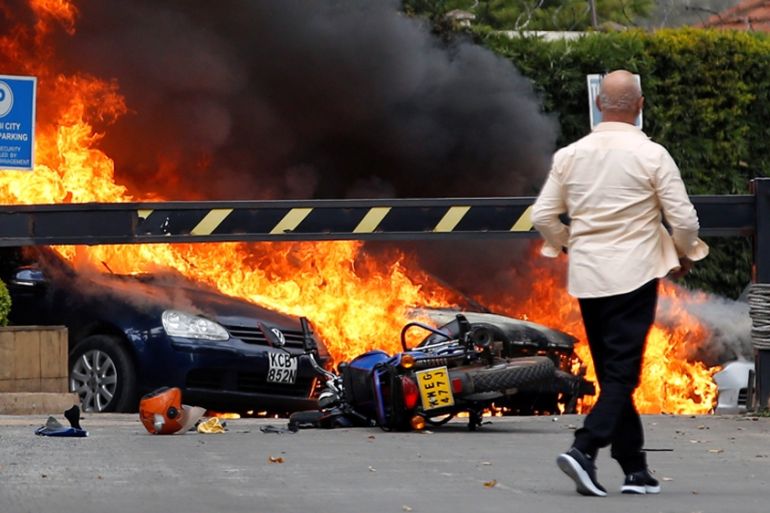Kenya hotel attack: ‘Painful and traumatising’
Survivors describe the al-Shabab attack on a hotel and office complex that killed 21 people.

On a windy Saturday afternoon, Mohamud Yassin is meeting two workmates in a quiet, posh Nairobi restaurant. Wearing black sunglasses and a knee-length blue thobe, he exchanges greetings with his colleagues with a smile on his face.
Despite his cool demeanour, Yassin is grieving.
Keep reading
list of 4 itemsAl-Shabab claims attack on UAE military in Somalia
Somalia begins ‘efforts to rescue’ UN helicopter crew held by al-Shabab
Al-Shabab captures UN helicopter in central Somalia
Three days before, five armed al-Shabab gunmen stormed Nairobi’s 14 Riverside complex killing 21 people. Two of them – Abdalla, 33, and Feisal, 31 – worked with Yassin at Adam Smith International, a United Kingdom-based company.
“It was a normal day,” Yassin says. “As usual, my wife dropped me at the office located in the 14 Riverside compound. I went in and greeted my coworkers, including Abdalla and Feisal,” Yassin, 36, recalls.
“At around 14:25, we heard explosions followed by gunshots. I immediately knew that we were under attack by al-Shabab. I have worked in Somalia for several years hence I am familiar with the group’s attacking tactics,” he adds.
Yassin and some of his colleagues managed to escape through a back route. Once out, they “could not account for Feisal and Abdalla who had gone out for lunch a few minutes before the attack commenced,” he said.
The al-Shabab fighters began the attack with an explosion near cars at the entrance of the complex and a suicide bomber detonating in the lobby of the hotel. The gunmen then entered the complex and started firing.
‘I will overcome’
Yassin and many other survivors remained outside the complex during the 20-hour siege, waiting to hear if friends and workmates were alive.
“We were all shocked to hear that 21 lives were lost, including my two dear friends. It is still painful to come to terms with what happened,” said Yassin.
“I now feel what many victims go through when they lose loved ones to such attacks. It’s painful and traumatising,” he said.
“I will overcome and work twice as hard as a tribute to my two departed friends.”
He hopes there won’t be another attack like it.
In a televised address, Kenya‘s president, Uhuru Kenyatta, said, “Multiple security efforts are under way to disrupt and defeat any terrorist attack. We are on high alert and shall remain so. All visitors and Kenyans are safe in Kenya.”
This is not the first time the east African nation has been attacked. In August 1998, the al-Qaeda bombed the US embassy in the central Nairobi, killing more than 200 people and wounding thousands.
In September 2013, al-Shabab gunmen attacked the capital’s high-end Westgate shopping mall in a three-day siege that killed 67 people.
Al-Shabab, which is linked to al-Qaeda, has launched a number of other attacks across the country in recent years; targeting churches and setting up landmines along the Kenya-Somalia border.
In 2015, the gunmen killed 147 students at Garissa University: the worst attack on Kenyan soil since the 1998 US embassy bombing.
Tracy Wanjiru, 28, survived both the attacks at Westgate shopping mall and Tuesday’s 14 Riverside attacks.
“Five years ago, I narrowly escaped the Westgate ordeal. I had moved on and never knew such a thing will ever happen again to me,” Wanjiru told Al Jazeera.
“I first heard the explosions and went out to check what it was. I saw human body parts flying all over the compound. I instantly knew that it was a suicide explosion after seeing a leg falling to the ground,” said Wanjiru.
The mother of one, who manages a salon and spa at the complex, was rescued by Kenyan security forces after hiding in her office with colleagues.
Just when the country was enjoying peace, these gunmen came and dismantled everything, Wanjiru said.
Kenyan troops in Somalia
In October 2011, Kenyan Defence Forces crossed into Somalia in pursuit of al-Shabab gunmen who had launched a series of attacks on aid workers and tourists months before.
The troops joined the African Union Mission in Somalia (AMISOM), a regional peacekeeping mission operated by the African Union and supported by the United Nations Security Council.
After that incursion, al-Shabab vowed to continue launching attacks in Kenya.
Al-Shabab said the attack on 14 Riverside was in retaliation for US President Donald Trump‘s decision to declare Jerusalem the capital of Israel.
The group is trying to prove its relevance in the wake of the US air attacks that have killed a number of its leaders in Somalia, said Tabitha Mwangi, a terrorism research associate at Nairobi’s Centre for International and Security Affairs.
“The group is trying to send a message through the 14 Riverside attack that it is strong and resilient despite losing most of its territory in Somalia,” Mwangi told Al Jazeera.
Mwengi advises Kenyan authorities to train all of its security agencies “on what to do in a suicide attack scenario instead of only relying on special operations units”, including “training them on to identify potential suicide attackers”.